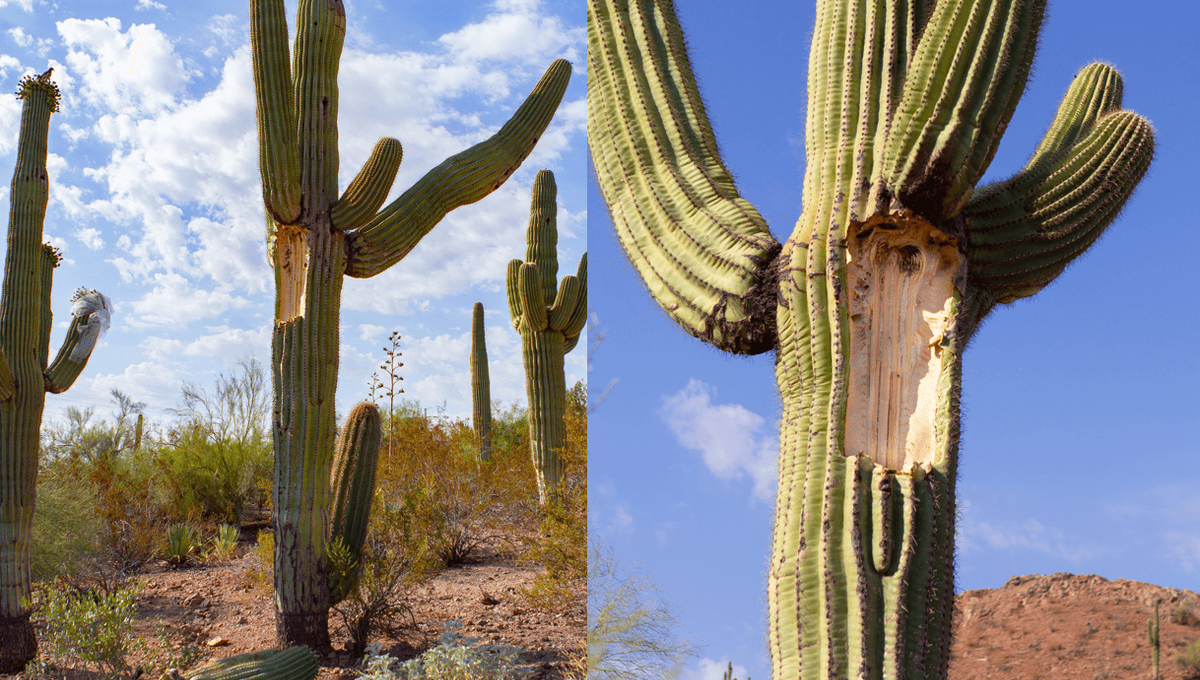
This summer’s heat is so intense that even cacti are struggling. Following a ridiculously hot July, the Desert Botanical Garden in Phoenix, Arizona, has shared how its cactuses are struggling with heat stress. Along with many turning a sickly yellow or even brown color and displaying signs of dehydration, a few have even lost their arms.
Phoenix saw an intense heat wave last month, with temperatures reportedly reaching daily highs above 43.3°C (110°F) for 31 days in a row. Authorities have reported 25 heat-related deaths in the city so far this year and are currently investigating a further 249.
Evidently, these kinds of temperatures are dangerous for humans. However, it appears the weather is even becoming too much for desert plants that are well adapted to living in scorching temperatures and blistering sun.
Posting on their Instagram, Desert Botanical Garden in Phoenix showed how the heat has taken its toll on their cactuses. Many have lost their color, displaying patches of yellow and green. Others have become so dehydrated their “ribs” are shrinking, getting closer together, and their flesh is not feeling as firm.
In at least three instances, their giant saguaro cactuses have come so damaged that they have lost arms.
Desert Botanical Garden was quick to point out that there was currently not enough evidence to say this summer’s extreme heat is causing a widespread die-off of saguaros, but they say the level of damage is significant.
“Since 2020, we have had elevated mortality in our population of saguaros compared to mortality rates pre-2020,” Kimberlie McCue, the garden’s chief science officer, told the Associated Press. “So part of our thinking is that there are still saguaros today that were compromised from what they went through in 2020. And that this could be sending them over the edge.”
While the days are when temperatures really soar, it’s often the nighttime heat that gets the desert plants. To avoid water loss during the hot days, cactuses typically wait until the cooler night times to open their pores to take in carbon dioxide. Over the past month, however, temperatures remained incredibly high even after the sun set. During multiple nights in July 2023, temperatures in Phoenix remained above 32.2°C (90°F) even in the dead of night.
The saguaro cactus is the iconic large tree-like cactus native to the Sonoran Desert in Arizona and the Mexican state of Sonora, as well as the Whipple Mountains and Imperial County areas of California.
As the largest species of cactus in the US, saguaro can often reach heights of 12 meters (40 feet) tall. The tallest saguaro cactus ever measured reached a height of over 23 meters (78 feet), according to the National Park Service. It takes time to reach these grand heights. It’s estimated that saguaro cactuses generally reach their full height at the grand age of 200 years old.
These majestic plants are built for the desert. Their shallow yet extensive root system is perfect for sucking up any rainfall. Once the cactus obtains the water, it does everything it can to keep it there. Their interior is filled with a sponge-like tissue, which holds the water for periods of drought. Their spikey spines help to ward off moisture-seeking animals, while their “skin” has a thick waxy coating that waterproofs the plant and reduces water loss.
These adaptations help make life in hot and arid environments a little easier, but even cactuses are not ready for the perils of our warming world. Studies have estimated that between 60 to 90 percent of the world’s 1,500 or so cactus species are likely to be negatively impacted by climate change, with some even facing extinction.
Source Link: It's So Hot In Phoenix Its Cactuses Are Losing Their Arms